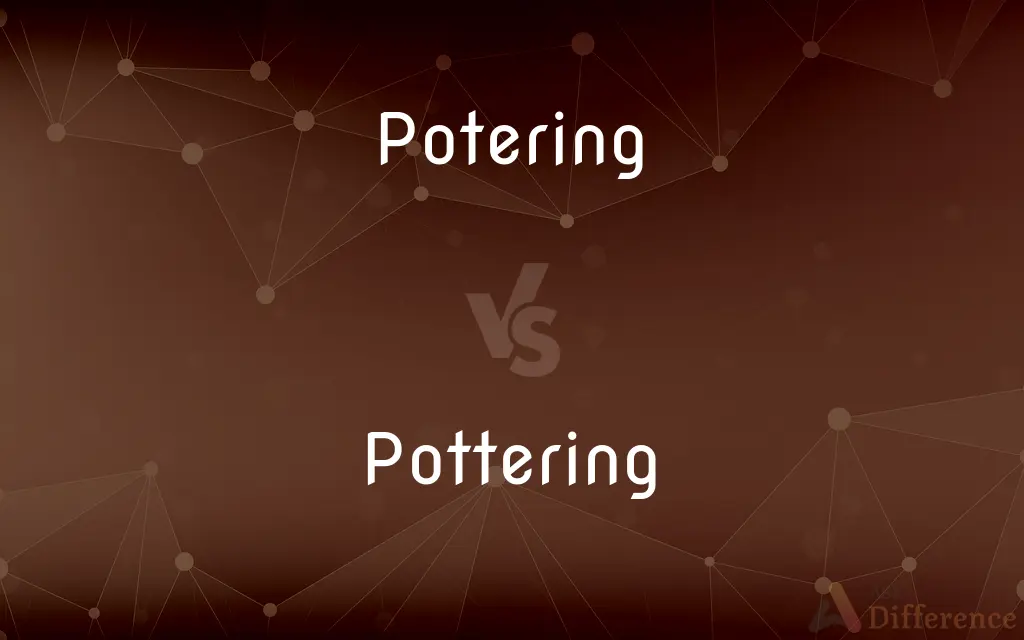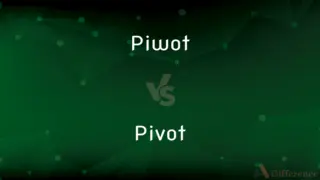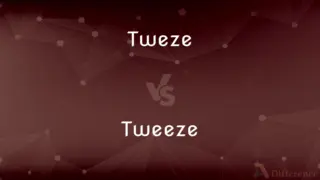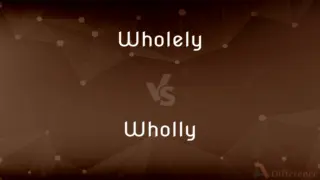Potering vs. Pottering — Which is Correct Spelling?
By Tayyaba Rehman — Updated on March 26, 2024
"Potering" is an incorrect spelling, while "Pottering" is correct. Pottering means occupying oneself in an unhurried, casual manner.

Table of Contents
Which is correct: Potering or Pottering
How to spell Pottering?

Potering
Incorrect Spelling

Pottering
Correct Spelling
ADVERTISEMENT
Key Differences
Relate "pottering" to "pottery," which also has two "t"s.
Remember "Potter" like the character Harry Potter, then just add "ing."
"Pottering" contains two "t"s and two "r"s, while "Potering" has one less "t" and "r."
Associate "pottering around" with "puttering around," both having double letters.
Imagine a potter at a wheel, taking his time – hence, the double "t" in "pottering."
ADVERTISEMENT
How Do You Spell Pottering Correctly?
Incorrect: Potering around the garden is very relaxing.
Correct: Pottering around the garden is very relaxing.
Incorrect: She spends her weekends potering in her studio.
Correct: She spends her weekends pottering in her studio.
Incorrect: He enjoys potering with his car on Sundays.
Correct: He enjoys pottering with his car on Sundays.
Incorrect: They were potering in the kitchen, baking cookies.
Correct: They were pottering in the kitchen, baking cookies.
Incorrect: I found myself potering through old photos all afternoon.
Correct: I found myself pottering through old photos all afternoon.
Pottering Definitions
Moving or going about aimlessly or casually.
He was pottering around the house.
Engaging in relaxed or aimless activity.
He spent the afternoon pottering in his garden.
Occupying oneself in a leisurely manner without urgent purpose.
She enjoyed pottering around her workshop.
Spending time in a pleasant, trivial manner.
Weekends are perfect for pottering around.
Doing tasks in a relaxed or unhurried way.
She's always pottering about in the kitchen.
Present participle of potter
The act of one who potters.
Pottering Meaning in a Sentence
Pottering around the house can be a great way to relax.
Weekends are perfect for pottering in the garden.
Pottering about in a bookstore is his idea of fun.
On his day off, he's usually pottering in the garage.
Pottering in the attic revealed some forgotten treasures.
They enjoy pottering around local antique shops.
She loves pottering in her herb garden during the mornings.
Many find pottering with plants to be therapeutic.
Quietly pottering in the library is how she unwinds.
Pottering in the kitchen led to the discovery of a new recipe.
A day spent pottering on the beach is a day well spent.
Pottering through the market, they found some rare spices.
Pottering with the boat, he made it ready for summer.
Her grandmother spent her evenings pottering with her knitting.
He's been pottering with that old radio for days.
She's always pottering around, looking for something to tidy or organize.
Pottering around the yard, she planned new landscaping ideas.
Pottering around the art studio sparks her creativity.
Pottering with DIY projects fills his spare time.
Their retirement is spent pottering around Europe, exploring new cities.
Common Curiosities
What is the root word of Pottering?
The root word is "potter."
Which conjunction is used with Pottering?
Conjunctions aren't specific to verbs; it depends on the context. E.g., "and," "but," "while."
Which vowel is used before Pottering?
The vowel "o" is used.
What is the pronunciation of Pottering?
It is pronounced as /ˈpɑː.tər.ɪŋ/.
Is Pottering a negative or positive word?
Neutral. It describes a type of activity without a value judgment.
Why is it called Pottering?
The term "pottering" likely originates from the unhurried and leisurely manner of a potter shaping clay.
What is the verb form of Pottering?
The verb form is "potter."
Is Pottering a noun or adjective?
"Pottering" is primarily a gerund, which is a noun form of a verb.
What is the singular form of Pottering?
Pottering doesn't have a singular form since it's a verb or gerund.
Is Pottering an adverb?
No, it's not an adverb.
Is the Pottering term a metaphor?
No, it is not inherently a metaphor, but it can be used metaphorically in certain contexts.
What is the opposite of Pottering?
Hurrying or rushing.
What is the plural form of Pottering?
Not applicable, as "pottering" is a verb or gerund.
Which preposition is used with Pottering?
Typically, "about" or "around" as in "pottering about" or "pottering around."
Which article is used with Pottering?
"The" can be used as in "the pottering about."
Is Pottering a countable noun?
No, it describes an activity and is not countable.
How do we divide Pottering into syllables?
Pot-ter-ing.
What is a stressed syllable in Pottering?
The first syllable "Pot" is stressed.
What is another term for Pottering?
Puttering.
Is the word Pottering a Gerund?
Yes, "pottering" is a gerund.
What is the second form of Pottering?
Pottered.
How is Pottering used in a sentence?
"She spent her morning pottering around the garden."
What part of speech is Pottering?
It is a gerund, which is a noun form of a verb.
What is the first form of Pottering?
Potter.
What is the third form of Pottering?
Pottered.
Is Pottering an abstract noun?
No, it's a concrete noun describing an activity.
Is Pottering a vowel or consonant?
"Pottering" is a word containing both vowels and consonants.
Is Pottering a collective noun?
No, it is not a collective noun.
Is the word Pottering imperative?
No, "pottering" is not an imperative form.
Is the word “Pottering” a Direct object or an Indirect object?
"Pottering" can be a direct object, as in "I enjoy pottering."
How many syllables are in Pottering?
Three syllables.
Which determiner is used with Pottering?
"Some" as in "some pottering around."
Share Your Discovery

Previous Comparison
Piwot vs. Pivot
Next Comparison
Tweze vs. TweezeAuthor Spotlight
Written by
Tayyaba RehmanTayyaba Rehman is a distinguished writer, currently serving as a primary contributor to askdifference.com. As a researcher in semantics and etymology, Tayyaba's passion for the complexity of languages and their distinctions has found a perfect home on the platform. Tayyaba delves into the intricacies of language, distinguishing between commonly confused words and phrases, thereby providing clarity for readers worldwide.



































